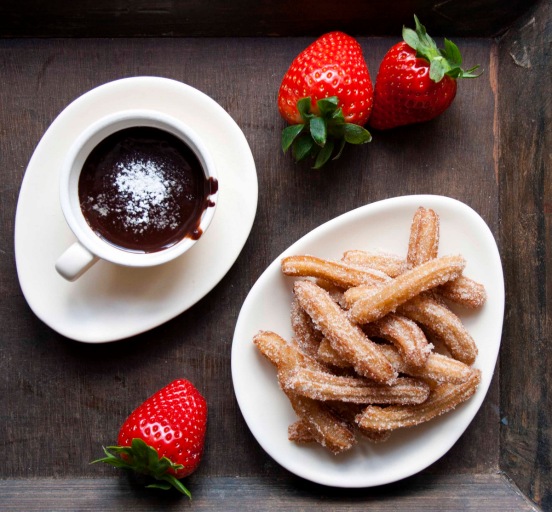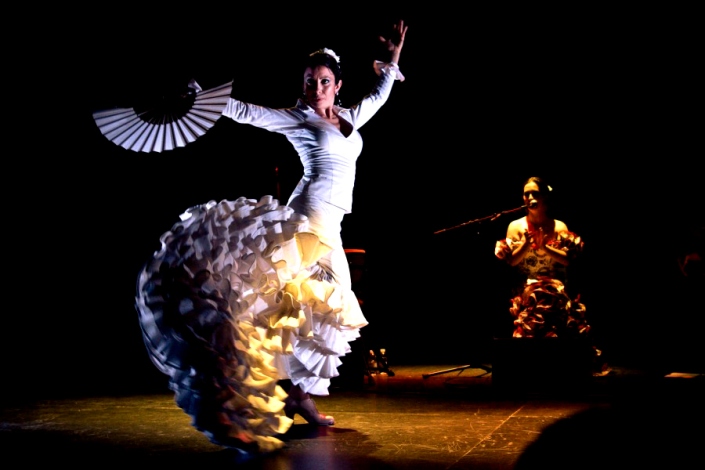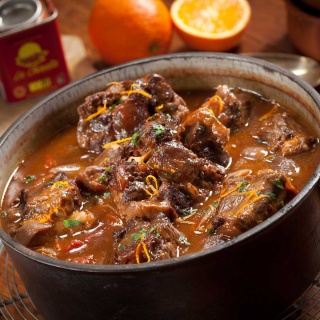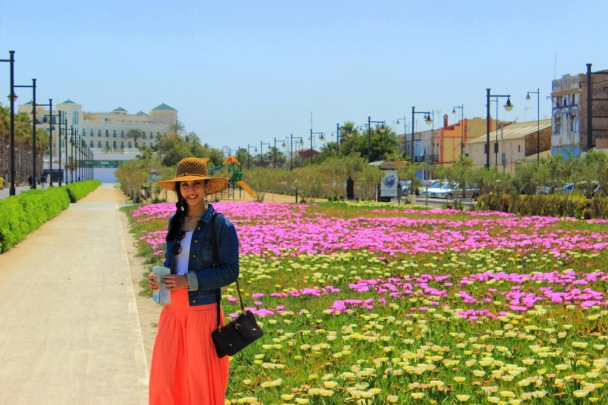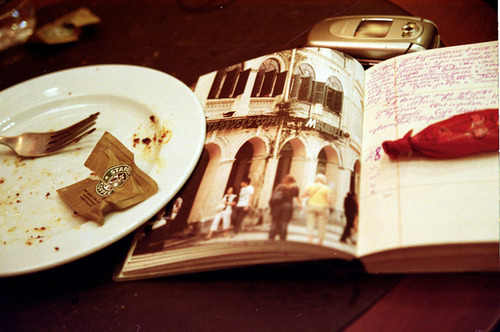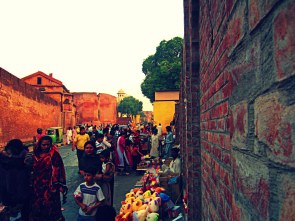Home
12 things this Pakistani girl loves about Spain
Published in Sunday Magazine, September 29th 2014
It’s been a full year since our peregrination to Madrid (hard to believe!), and I think I’ve come a long way from those initial months of confusion, misplaced nostalgia, and sometimes plain despair (among other unproductive emotions that beleaguer you at every move!)
For one, I can (sort of) speak Spanish. I’ve made friends. I even have a (sort of) job! I can navigate the city fairly well – I’ve visited the doctor, the dentist, the real estate agent, the immigration bureau, even the police station (don’t ask), without any major communication disasters occurring. I’ve traveled around the country a fair bit. I’ve been taken for a local and given directions to lost tourists (score!). And, though there are obviously bothersome things about every country, I find myself quite enamored of Spain. Here are just a couple of reasons why, in no particular order!
1. Hot Chocolate
It’s traditional to begin AND end the long Spanish days with a cup of thick, intensely dark hot chocolate, often with a side of churros (long, deep-fried dough pastries for dipping). Some chocolaterías, like the 19th century San Ginés in historic Madrid, are open 24 hours – so you can amble down for an indulgent treat any moment it grabs your fancy. A chocoholic like me can’t complain!
2. Festivals
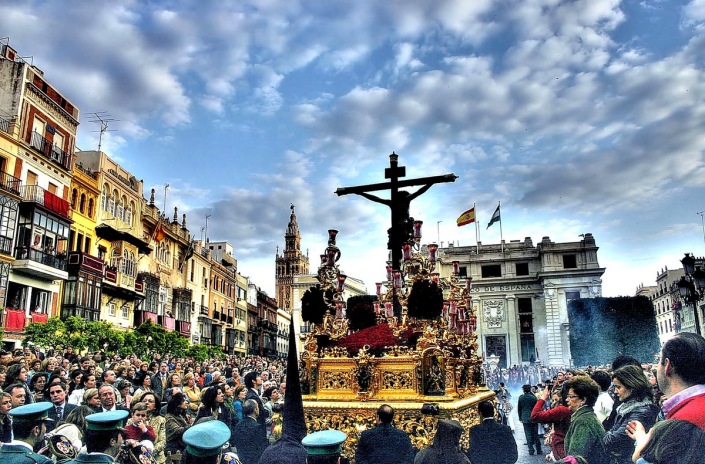
Spain does festivals like nobody’s business, second only to India when it comes to the sheer number of public celebrations and commemorations in the country. The most spectacular among these is Semana Santa or Holy Week (Easter), curiously similar to Ashura in Muslim countries, where participants in full costume re-enact Jesus Christ’s crucifixion and resurrection over the course of 7 days with elaborate floats, music, and in some places, self-flagellation. There are festivals dedicated to saints and to devils, to horses, flowers, geese, tomatoes, bulls, newborn babies, even paper-mache monsters!
3. “Harem Pants”
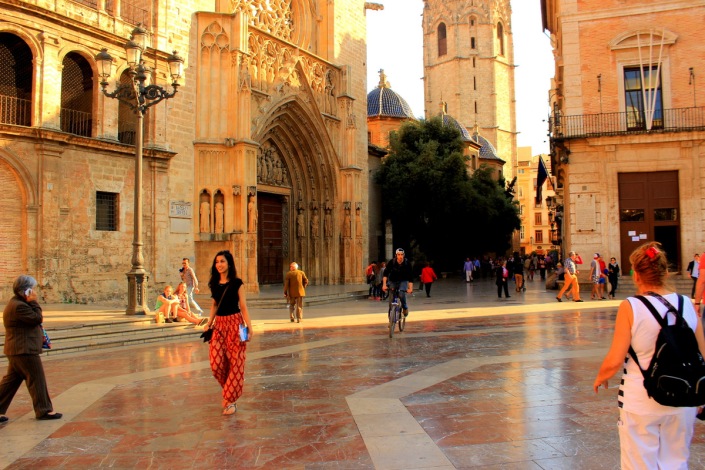
You can literally roll out of bed in a printed shalwar and T-shirt and step onto the streets of Madrid or Barcelona perfectly in sync with fashion. Harem pants, as they are known in the West, are a perennial component of the trendy Spaniard’s wardrobe – the baggier, the better! Could “dressing up” get any easier?
4. Beards & Piercings
Dark-bearded men and nose-studded women are as ubiquitous on the streets of Spain as in Pakistan, partly thanks to hipster trends. So you can comfortably sport your preferred style of facial hair (if you are a man), or a nice twinkly nose piercing (if you are a man or woman), without the least fear of being eyed suspiciously and stereotyped “terrorist”, “punk”, or, most annoyingly, “oh-so-exotic!”.
5. Moorish Spain
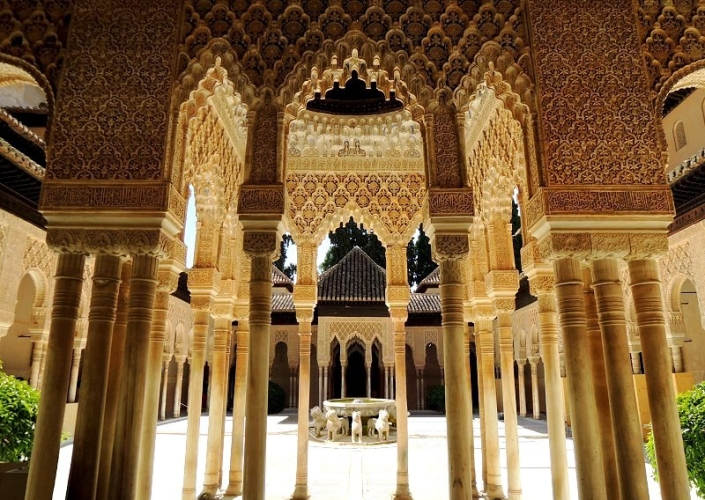
Stroll under the Damascene arches of the oldest surviving mosque in Europe, the Mezquita of Cordoba, dating to 785 A.D. Wander through the ethereal Nasirid Palaces of the Alhambra in Granada, the Muslims’ last stronghold in Spain. Treat yourself to a milky Té Pakistani in an evocative tetería. There is an undeniable romance about al-Andalus of yore, and for some romantic reason, you feel as if you share a part of its history.
6. Flamenco
Spain’s most iconic song & dance form has roots in North African and Gypsy (“Roma”) culture. Roma people were originally from the Indian subcontinent, and migrated to Europe about 500 years ago. The mix of cultures produced a unique dance that emphasizes not feminine delicacy and beauty, but feminine power and strength – stomping, sweating, shouting and all! You gotta love it.
7. Olives
Aceitunas have been one of the healthier additions to my diet since moving to Spain. With the cultivation of olives dating to ancient Roman times and improved upon during the Moorish era, Spain today produces about 300 varieties of olives in all shapes, sizes, tastes and textures. Next to my mother’s hand-cured green olives from a family orchard in Pakistan, juicy Spanish olives stuffed with garlic are the yummiest snack I could ask for!
8. Spanish Idiom
Express yourself like a true Pakistani in the Spanish language! From Ojalá (Inshallah), Venga! (Chalo), Que? (Kya?), Hermano (Bhai / Yaar), Adiós! (Khuda Hafiz!) even Ala! (Hai Allah /Allah Tobah!), the flavor of spoken Spanish is remarkably similar to Urdu or Punjabi, with many words derived from Arabic.
9. “Laid back” – in a good way!
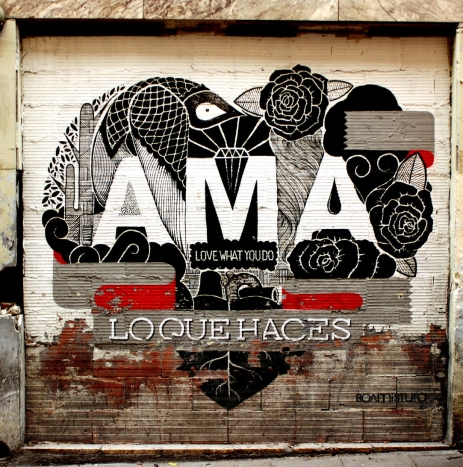
Spaniards have a bit of a reputation for laziness, but from what I see, they work as much as any of their counterparts in the Western world, without the uptight fastidiousness. So, yes, a waiter will probably take 20 minutes to come and take your order, but he or she will also not pester you to pay or vacate your table until you are ready to leave, whenever that may be! Yes, most administrative offices, pharmacies and private businesses take a 3-hour lunch break, but when they serve you, they are always friendly, accommodating, and seem to genuinely enjoy their job, no matter how mundane it may be. I think the system works!
10. Rabo del Toro (Oxtail Stew)
The Spanish version of a Pakistani Aloo Gosht or Nihari – succulent bull or oxtail, slow-cooked in its own stock and a rich gravy of onions, tomatoes, potatoes and other vegetables and spices, till the meat literally falls off the bone. Scoop it up with crusty pieces of bread just like you would do with Naan or Roti back home – riquísimo!
11. Nightlife – Ronaq!
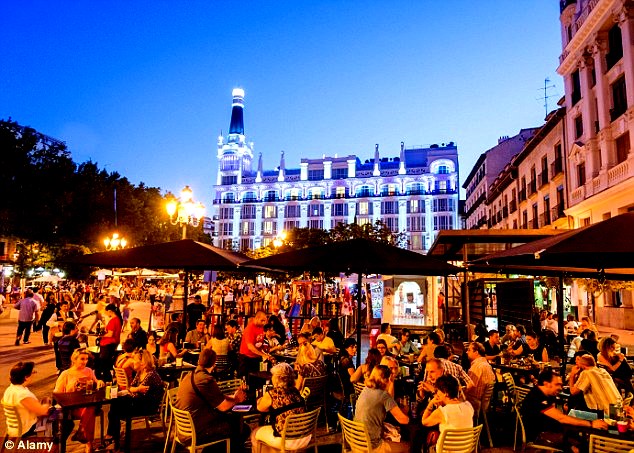
Go for a walk in any barrio or neighborhood in the city center at 1:00 am on a weeknight, and find warmly-lit restaurants and cafes bubbling with customers, street performers juggling fire on the sidewalks, couples strolling along with little children in tow, boisterous touts trying to lure you into nightclubs. And the weekends? Soundproof windows recommended if you want to get any sleep! No matter the unemployment and fiscal crisis, the Spaniards know how to have a good time.
12. Compliments!
In most places in the world, being addressed as “pretty girl” (guapa), “little girl” (niña), or “queen” (reina) by a complete stranger would be considered offensive, and probably make you uncomfortable. Not in Spain! Shopkeepers, street vendors, waiters, passersby, men and women can call you all those things in Spanish without a trace of sleaziness. Now why wouldn’t that make you feel good? Add to that their beaming smiles and ready greetings, it’s impossible not to feel happy and welcome in this country.
“How to Make Friends in a New City” – Published on BootsnAll!
Dear readers,
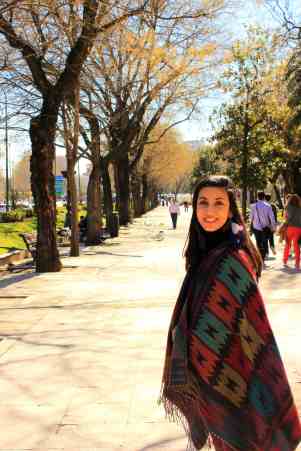
My recent series of blogposts, recounting my (mis)adventures as a fresh-off-the-boat expat in the splendid Spanish capital of Madrid, was published today as a feature article on BootsnAll, the largest and most popular online resource for independent travelers! Of course, I’m muy excited about it, and would love for you to read and share the article with your friends!
How to Make Friends in a Foreign City – Essential Tips from a Nueva Madrileña
And thanks as always for your patience with my protracted disappearances. I’ve been up to many things, and I’ll recount them to you in due time :)
Abrazos from Madrid,
Manal
How to Make Friends in a New City – Tip #5
- No te preocupes! Don’t worry! Let the universe do its thing!
This is something I’ve learnt along the course of my somewhat peripatetic life the past 6 years: sometimes, people (and opportunities) fall into your lap in the most unexpected, unlooked for way; and these congenial little windfalls may be the best things that happen to you in your new home.
I remember a certain day in Ithaca, New York, where Z and I had moved right after getting married. Z was in class at Cornell, and I was busy cleaning, unpacking and ‘nesting’ in our new apartment, a ground-floor portion of a typical East Coast colonial house, when our gritty old landlord Carl ambled up to the front door, dressed in his customary red plaid shirt and classic blue jeans. “Hey there!” Carl hollered, “I wanted to introduce you to these nice folks,” he gestured towards the smiling young couple that followed him. “They’ve just moved to Ithaca from Mexico, and are thinking of renting from me as well!”
That was the first time I met Elsa & Silvano. Though we only spoke for five minutes, standing in the porch of Carl’s yellow-painted dollhouse, and thought they didn’t end up renting from him after all, they became our closest companions the 9 months we spent in Ithaca, and we still count them among our dearest friends.
So, just like that, someone may chance to cross your path, and you’ll hit it off with them like you never imagined. Maybe a friend of a friend puts you in touch with somebody they know who happens to live in the same city; and you turn out to be kindred spirits, Anne of Green Gables-style. Or maybe another like-minded soul, going through the same experiences as you, discovers you and contacts you through your blog!
I find it so interesting, how these connections are made – magically, almost – bringing complete strangers together through no deliberated effort. So, if you ever find yourself lost, alone and friendless in a new city, wondering why on God’s earth you ever transplanted yourself in the first place: don’t worry! It takes time for a plant to adjust to new soil, a new atmosphere. But once it gets over the wilting, drooping, moping period – ‘transplant shock’ in botanical terms – it thrives. In fact, if you don’t keep an eye, it may even start merrily taking over your garden, and you won’t know what to do! :)
Happy New Year from Madrid! Here are some photos we’ve taken of the city’s squares, streets and public spaces.
Read Tip #1,Tip #2, Tip #3, Tip #4, and the introductory post of this series!
Old Lahore
Eid Mubarik, dear readers, from me and my beautiful city of Lahore! Enjoy these photos of Old Lahore, taken over the years on trips back home, as the city changes from daytime stateliness to magical after-dark chaos.
Click here to view the complete set of photos on Flickr.
Thoughts on Leaving Pakistan
Published in the The Friday Times Blog, October 10th 2013
The last time I put thoughts to paper was a year and a half ago, when Z and I moved back to Pakistan from the U.S. It happened very suddenly, under very sad circumstances, and there we were – thrust into a disorienting new life, filling roles we had never anticipated, never wanted, inhabiting, once again, the cloistered, uninspiring world of Lahore’s privileged class.
Much elapsed during the past 18 months in Lahore – much to rejoice and remember. Engagements, bridal showers, weddings. Baby showers, and babies! Farewell parties and welcome-back parties, birthday parties and Pictionary parties.
PTI fever, elections, and Pakistan’s first peaceful political transition. Cliff-diving in Khanpur under a shower of shooting stars, dancing arm-and-arm with Kalash women as spring blossomed in the Hindukush, tracking brown bears and chasing golden marmots in the unearthly plains of Deosai.

I rediscovered my love of history, of abandoned old places that teemed with a thousand stories and ghosts and memories, thanks to a research job at LUMS. I spent many days wandering the cool corridors of Lahore Museum, many hours contemplating the uncanny beauty of the Fasting Siddhartha, whom I had the privilege of photographing up-close. I stood beneath the most prodigious tree in the world in Harappa. I got down on my knees with a shovel and brush during a student archaeological excavation in Taxila, personally recovering the 2, 000-year old terracotta bowl of a Gandhara Buddhist monk.

But, there was also dissatisfaction. Frustration. Restlessness. When we were not travelling, we were in Lahore. And Lahore was, well, warm. Convenient. Static. Living there again was like a replay of our childhood; like watching a favourite old movie on repeat. After a while it got monotonous, somewhat annoying, and a little disappointing.
In Lahore, I could see what the trajectory of my life would be, the next 10 years down. It was all planned out, neatly copied from upper-class society’s handbook, with but minor divergences here and there.
It wasn’t a bad plan. In fact, it was a perfectly good, even cushy plan, one that would have made a lot of people quite happy.
Not me.
There were other things, too, about Lahore, and about Pakistan, things that had bothered me growing up but now seemed magnified to alarming proportions – the incomprehensible extremes of wealth and want, the insurmountable divisiveness of class, and, most worrying of all, the overwhelming self-righteousness and religiosity.
You could not escape it. Everywhere, from TV talk shows to political rallies, drawing rooms to doctors’ clinics, there was a national fixation with religion. Everybody, it seemed, was desperate to convince others – and themselves – of their absolute piety, their A+ scorecard-of-duties-towards-God, their superficial Muslim-ness. Instead of the genuine, unselfconscious goodness that shines through truly spiritual people, in Pakistanis I just saw fear. Religion for them wasn’t about peace, and love, and knowledge. Religion was base. Religion was social security. Religion was a tool of power.
I wanted to say to these superficial Muslims, to all Pakistanis: Just look at the state of our country. Do you really believe that religion has helped us? Has it at any level, be it individual, societal or state, improved the country? Has it alleviated poverty, reduced rape and murder, mitigated corruption?
Have we as a nation achieved anything positive, anything progressive, in the suffocating garb of “religion”?
No. On the contrary, we, as a nation, have become more intolerant, more oppressive, more barbaric, as our outward religious zeal reaches new heights.
And we still do not realize it. The Matric-fail maulvi at the local mosque still preaches that a woman wearing jeans in public is jahannumi, Hell-bound , the TV reporter interviewing an old peasant who has lost his home in a flood wants to know if he kept his Ramzaan fasts, and that educated, apparently “modern” aunty you met at a family dinner launches into a sermon that the reason Pakistan is beset with crises is because we don’t pray enough.
That was the most terrifying thing I found about Lahore, and about Pakistan. It had become a place where no other framework for discussion about the future of the country, about anything at all, was possible. We were mired in religion. We were stuck. We were deeply and hopelessly stuck.
As for the people who thought differently, the elite and “enlightened” class that I belonged to, they responded to the onslaught by retreating further and further into their elite Matrix – a sequestered, protected world where they met up with friends over Mocha Cappuccinos at trendy New York-style cafes, where they shopped for designer Italian handbags in centrally air-conditioned shopping malls, where their children spoke English with American accents and dressed up for Halloween, where alcohol flowed at raucous dance parties behind the gates of a sprawling farmhouse.
It was a parallel universe, where we all lived free, modern lives, like citizens of a free, modern country, utterly disconnected from the “other” Pakistan, the bigger Pakistan, and for all intents and purposes, the “real” Pakistan. Yet perhaps it was our only survival, the only way to keep sane and creative and happy for those of us who chose to live in our native country.
But I could not reconcile myself with it. I found it schizophrenic. Perhaps living abroad had changed me too much. I could not find balance, I could not find peace in Lahore.
So when Z applied to and got selected for a European Union PhD scholarship based in Madrid, Spain, I was thrilled – and a little relieved. Was I looking for an escape? Maybe. Was that the only solution? I don’t know.
When we left Lahore, on that eerie twilight flight in August, our lives packed into just one suitcase and backpack each, it was bittersweet. I was sad to say goodbye to loved ones, to friends and family whom I had spent such wonderful moments with in the past year and a half. I would miss being a part of their lives. And I would miss the incomparable natural beauty of Pakistan – beauty and heritage that is disappearing day by day due to neglect and ignorance.
Yet, I knew that I had to go. I knew that staying in Lahore – “settling for” Lahore – buying joras from Khaadi, attending tea parties, managing servants, the odd freelancing or part-time job at LUMS, was not going to make me happy. And we could not depend on the love of family and friends to sustain us forever. At the end of the day, everybody had their own lives to lead, their own paths to carve, their own hearts to follow.
And that is how we ended up in Madrid.
Sitting here in our apartment, a cozy, parquet-floored 1-bedroom affair, I can hear the babble of excited young voices below the window, a medley of idioms and accents; the clink of glasses and clatter of dishes from neighbouring restaurants; the smoky strumming of a flamenco guitar, the wheezy chorus of an accordion; the cries of Nigerian hawkers and Bengali street-peddlers, and the low hum of the occasional taxi cab, rolling along the cobbled streets of this lively old pedestrian barrio of the Spanish capital.
A new city, new adventures, new memories.

Kalash Valley, Pakistan

In May 2012, I was lucky enough to take what was truly a once-in-a-lifetime trip, to a remote corner of the Hindukush mountains in northwest Pakistan. Near the town of Chitral (at an elevation of 3, 700 ft), and a 26-hour drive from my hometown in the plains, Lahore, the Kalash Valley is home to a small but unique tribe of people, the Kalash, “the wearers of the black robe”, Indo-Aryans who settled among these rugged peaks thousands of years ago, and have held on to their ancient beliefs, language and customs since then, while the rest of Central Asia assimilated to Muslim culture.
We visited the Kalash village of Bumburait at the time of their annual Spring Festival, “Chilum Josh“, and got the chance to see the iconic Kalash in all their pomp and glory. Their population, which was once fast declining due to forced conversions, is now on the rise; protection by the Pakistani government and growing local tourism has helped them maintain cultural independence.
Let this album take you on a photographic journey, from the windswept highways of Khyber Pakhtunkhwa province to the bustling streets of Chitral town, to the vibrant, beautiful faces of Kalash women and the windy, shadowy alleys of their hamlets on the hill.
Many thanks to the brilliant folks at Adventure Travel Pakistan for organizing the trip!

Thoughts on Moving Back to Pakistan
Published in the Express Tribune Blog, May 21st 2012
When my husband and I moved to the U.S., we knew that it wasn’t for good. Contrary to everybody’s assumptions, we knew that we were going to return to Pakistan, at some point in the meandering, distant future.
But we never imagined that it would be now, so suddenly, so unexpectedly, and under such sad circumstances.
As I sit here in the study of my in-laws house in Lahore this sunny April afternoon, looking out on a sumptuous garden decked with purple petunias, crimson lilies, snow-white roses and bright bougainvillea, listening to the chipper of birds and the low chatter of servants in the kitchen, New York seems like another planet – another time, another dimension, a past life that may or may not have even happened.
So many times we discussed this, our move back to Pakistan, my husband and I. Living in America had unalterably changed us; there, in our little 1-bedroom apartment complete with leaky faucets, mousey kitchens and batty landlords, independent for the first time, we realized how unnecessarily indulgent and painfully isolated our lives in Pakistan had been. While Occupy Wall Street was raging on in New York, we used to joke with each other about being the “covert Pakistani 1%” in the enthusiastic, indignant ranks of the “American 99%”.
“But I don’t think I could go back to living like the 1% or 5% in Pakistan, the way we grew up,” I used to say. “I hate the idea of being waited on by a troop of servants when I know I’m perfectly capable of doing their chores myself. I hate the idea of living in a 2-story, 4-bedroom mansion while a whole family sleeps, eats, dresses in a single cramped ‘quarter’, dusting and sweeping a dozen rooms that nobody uses. I just could not live in such a disparate situation.”
It wasn’t just upper-class guilt and a stubborn sense of egalitarianism rearing its head. There was also something else – the beauty and indelible satisfaction of doing things yourself, of building your physical world with your own hands. Of chopping the garlic, peeling the onion, painting the wall, scrubbing the bathtub, carrying a nice heavy bag of groceries upstairs to your apartment.
Sure, I complained about it sometimes, but I was secretly proud of it too. For somebody who had never even fried an egg by herself, let alone stand in long, sweaty queues at the Post Office or trudge a mile to do laundry, the daily struggle was a revelation. It was something you shared with the people around you. You felt a camaraderie with the strangers on the subway, the families who shopped at your neighborhood grocery store, the cab drivers, the receptionists, the waiters at your favourite restaurant. No matter who they were, where they came from or what work they did, you had something more meaningful in common with them than just the colour of your passport. Call it class blindness or class ignorance, I loved the feeling.
And, naively, I believed we could replicate that sense of camaraderie and egalitarianism with the ‘common man’, in Pakistan. That we could forge an alternative, healthier, more connected way of living, different from that of our class and our our parents; we could live in a smaller house or apartment, for starters. We could learn to take public buses, and walk to the bazaar instead of taking the car or sending a servant. We were young – we didn’t need servants obsequiously lingering about all day to feed our lethargy. If we had money to spare, we could put a poor man or woman through school instead, or a training course for a skill he or she had always wanted. We could live comfortably, but simply, with less material things, less “luxuries”, fewer TVs and cars and expensive dinner sets. It was possible, I insisted. We could reinvent ourselves in Lahore too!
My husband was skeptical, realistic. “We are who we are in Pakistan – the privileged. And it’s pointless to try to be anything else, because that can’t change. We just have to do the best we can in the roles we’ve been given.”
I didn’t agree. I believed every person had the power to change their situation, even if in a very small way.
But now that we’re actually back in Pakistan, all that seems like selfish banter, a pipe dream, wholly insignificant in the larger picture. Suddenly, we find ourselves thrown into roles, situations and relationships that we never envisioned, never planned, never wanted. We find ourselves perpetuating the status quo, the class consciousness we wanted to break. I feel the Lahore lethargy seeping into my life, my mind, slowly sapping the vigour and determination I felt before. I don’t want to walk to Al Fatah anymore, people will stare. I don’t want to take the public bus, it’ll be hot and uncomfortable. I don’t want to iron my own clothes, because I’d rather sit at the computer or read a book or take a nap; besides, that’s what the maid is there for…right?
I often wish I was immune, the way people are, to the unpalatable realities we live with in Pakistan. I wish I could authoritatively give orders to the servants like they’re used to, shoo away that pesky beggar like she’s used to, tip the Al Fatah boy with a crumpled 20 rupee note because you have to give something, gloat over the few hundred rupees you “saved” from the cloth merchant because you always get a bargain – I wish I could occupy the upper-class woman’s “role” with ease and flair, but if after 22+ years of living in Pakistan I’m still not able to do it without extreme discomfort , will I ever be?
That’s not me. And I don’t want to be that person. I don’t want that “power”, that patronizing, suffocating power, and the guilt that comes with it.
Perhaps it’s impossible after all, to create that kind of life in Pakistan – the kind of life we had in America. For all its problems and its flaws, life there taught us not to take even the basics for granted. It taught us the value of hard work and instilled in us a sense of equality and humanity we had never experienced in Pakistan – a kind of class blindness. We could live in any sort of neighbourhood we chose, make friends with anyone we wanted, eat and shop where we liked, do any kind of job; and there was no judgment, no binding social norms and family legacies to contend with.
It’s true that there will always be someone who is less privileged than you. But the divide need not be so wide, so unjust, so tragic it makes you want to cry, if you only think for a moment about the difference between you and the man who cooks for you in the heat of the kitchen all day. I would rather be the 99% than the 1%, any day, in Pakistan or any other place – if only I had the choice.
My favourite things to do on a blustery winter day
Last Saturday’s aberrant snowstorm notwithstanding, I love winter. I think it’s because of my predisposition to piping hot sweets and cuddly sweaters – no sooner does the air get that dash of crispness, and the first faded leaf twitters to the ground, that I wake up with a craving for warm apple pie and an urge to order ten new turtle-necks from the Land’s End catalogue.
Here are some of my favourite things to do during a freak snowstorm, or on a particularly chilly winter day, best enjoyed from your apartment window with a steaming mug of tea or coffee, watching the flakes drift down and gather at the pane, like little Kay in the The Snow Queen. What are some of yours?
- Knitting
My goal is to be at least half as good a knitter as Naani, my maternal grandmother was, from whom I learnt my first slip-knot at age 8, and my other grandma, Aunty Z, who re-introduced me to this meditative woolly pleasure at age 25. They were true maestras, these women, with every little sweater knitted for a grandchild a timeless work of art. I’m just a beginner, at the oh-no-I-dropped-a-stitch scarf-mode, but hopefully I’ll get somewhere near them one day!


- Baking / Desserts
I’ve always liked making desserts, and I like to eat them even more. Since coming to America, though, I’ve been spoiled by Keebler pie crusts and Pillsbury and Trader Joe’s baking mixes. But sometimes, you just need to sink your teeth into a crispy, flaky, butter-glazed, hand-kneaded pie crust.

You can’t do the short-cut with halvas. The penultimate Pakistani dessert, rich, velvety, sinfully sweet, synonymous with winter in my hometown Lahore – I can just smell the ghee and milk, the brown sugar, the cardamoms, saffron, almonds, carrots, semolina or chickpeas, depending on what kind of halva my mum was making that day, simmering for hours on the stove…I’ve yet to muster the courage to cook one of these on my own!

- Reading
This is, of course, one of the most enjoyable activities ever at any time of the day, any day of the year, but even more so on a day when you just want to wrap yourself up in a soft hand-me-down blanket and not move. Not move, not think, just lose yourself in some fantastic world, centuries away, meandering and mysterious, rife with kings, queens, heroes, romance, magic…The Arabian Nights, The Lord of the Rings, The Alchemist, and fairytales of any kind rank high on my list. Current favourite is Samarkand by Amin Maalouf, a plum of cocoon-reading if there ever was one!
- Origami
I bought an Origami Suncatchers Kit from Barnes & Noble on an impulse, and spent the next one week bent over a coffee table strewn with colourful glazed paper, glue and fishing string. Z would find me in the exact same position every time he came home from work – the house fell into a state of neglect, dinner was reduced to pita and hummus, episodes of the Colbert Report backed up…and voila! The prettiest things to have come out of a thoroughly home-bound day :)
- Board Games
Maybe my 25+ friends think I’m geeky for still obsessing about board games, but I don’t care! It’s my dream to have a whole store of them one day, and host extravagant board game bashes every weekend. Can there be a better way to pass time with people on a blustery winter day? The blizzard would long be over before someone declared victory in Monopoly or Catan, and you’d look out of the window and say, “Hey, when did it stop snowing?” Such is the beauty of board games.

That’s one thing I miss about living in a dorm – willing game players were never in short supply. And what I miss even more are those nippy evenings in Lahore, when the whole troop of cousins would gather in front of a gas heater at our grandparent’s or eldest aunt’s house every Sunday for a religious contest of Ludo, Carom, Cluedo, PayDay, and as we got older, Pictionary, Tabboo, Cranium…

Well, stay warm, and enjoy your winter, folks! :)
